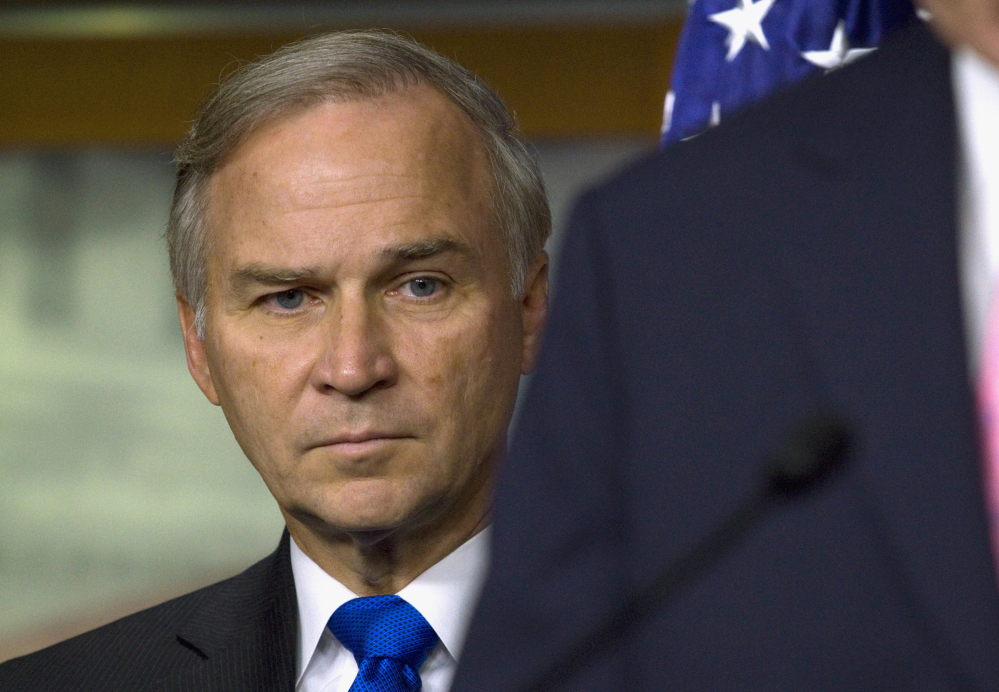WASHINGTON – House Republicans urging a steep increase in the Pentagon’s budget have received $10 million in campaign contributions over the course of their congressional careers from defense contractors that would benefit from higher levels of military spending.
The 34 GOP lawmakers, all members of the House Armed Services Committee, are pressing for an $18 billion increase in the 2017 budget year, which begins Oct. 1. The push is rooted in their position that the U.S. military has atrophied severely on President Barack Obama’s watch, leading America’s allies as well as adversaries to question the country’s will.
The bid also reflects the message GOP presidential candidates have hammered relentlessly on the campaign trail, where Obama has been cast as a feckless commander in chief. Sen. Ted Cruz, R-Texas, last week unveiled his blueprint for a “Reagan-style military buildup” to reverse the damage he said has been done during Obama’s two terms. Cruz didn’t say exactly what his plan would cost.
Critics of boosting the Defense Department’s budget by billions of dollars say Obama hasn’t gutted the armed forces. Instead of pressing for more money, they said, lawmakers should be focused on cutting wasteful programs, trimming bloated bureaucracy, and forcing the Pentagon to manage its money properly.
The Government Accountability Office has identified several areas of the department as “high risk” when it comes to waste and fraud, including weapons purchases and financial management. It’s a jarring verdict considering the military accounts for half of all the U.S. government’s discretionary spending.
“Republicans claim that throwing more money at the Education Department won’t make our kids smarter,” said David Williams, president of the nonprofit Taxpayers Protection Alliance. “If that’s the case, then just throwing more money at the Pentagon won’t make us any safer.”
Claude Chafin, a spokesman for the Armed Services Committee, said the interests of contributors played no role in the members’ recommendation. He said the $18 billion increase is aimed at filling crucial gaps in the $583 billion defense budget Obama submitted to Congress earlier this month.
He said it’s based on the amount the Defense Department said last year it would “need to keep America safe,” and since then, “the world did not get $18 billion safer,” Chafin said.
The committee’s chairman, Mac Thornberry of Texas, topped the list of recipients with $941,700 in contributions made by employees of and political action committees sponsored by companies that do business with the Defense Department, according to an Associated Press review of data compiled by the political money tracking website OpenSecrets.org.
Thornberry’s single largest group of donors, $153,400, are affiliated with defense industry giant Lockheed Martin. The company is manufacturing the F-35 Joint Strike Fighter, the single most expensive military project in history. Thornberry’s 13th congressional district in north Texas abuts the 12th district, where the F-35 is manufactured. He was elected to Congress in 1994.
Two Republicans whose districts include parts of Virginia’s defense-industry rich Eastern Shore tallied the second and third highest amounts.
Rep. J. Randy Forbes, chairman of the subcommittee that oversees Navy and Marine Corps programs, received $801,606 in defense contributions, according to the data. Donors from defense contractors Northrop Grumman and BAE Systems accounted for $144,350 of the total. Both companies have major roles in the production of the F-35. BAE Systems also operates a ship repair facility in Norfolk, Virginia, which is also home to Naval Station Norfolk – the largest naval complex in the world. Forbes has been in office since 2001.
The chairman of the military readiness subcommittee, Rep. Rob Wittman, collected $701,286. He is in his fourth full term. Major donors to Wittman’s campaigns include Northrop Grumman, BAE Systems and Huntington Ingalls Industries, which builds the Navy’s nuclear aircraft carriers and submarines in Newport News, Virginia.
Politicians are allowed to receive campaign contributions although the sources and amounts are governed by federal campaign finance law. Individual donors, for example, can contribute no more than $2,700 to a federal candidate each election cycle.
Thornberry, Forbes, Wittman and the 31 other Republican members of the armed services committee spelled out their argument for more defense spending in an 11-page letter sent to the chairman of the House Budget Committee a few days before the president delivered his defense budget.
They said the U.S. needs to “reclaim its role as a global leader” to counter threats that “are greater than at any time since World War II.” They chided Obama for claiming during his State of the Union address that the U.S. spends more on its military than the next eight nations combined. “No other nation has the global commitments that we do,” they wrote.
Rep. Adam Smith of Washington state, the top Democrat on the Armed Services Committee, called Obama’s defense budget a “pretty solid starting point” during an interview Sunday on C-SPAN’s Newsmakers. He said he’s open to the idea that “maybe we need a little more.” But Smith dismissed the GOP’s criticisms as more partisan and political than substantive.
“It’s not necessarily the amount of money you spend,” Smith said. “It’s how you spend it and whether or not you are spending it wisely.”
Associated Press researcher Monika Mathur contributed to this report.
Send questions/comments to the editors.


